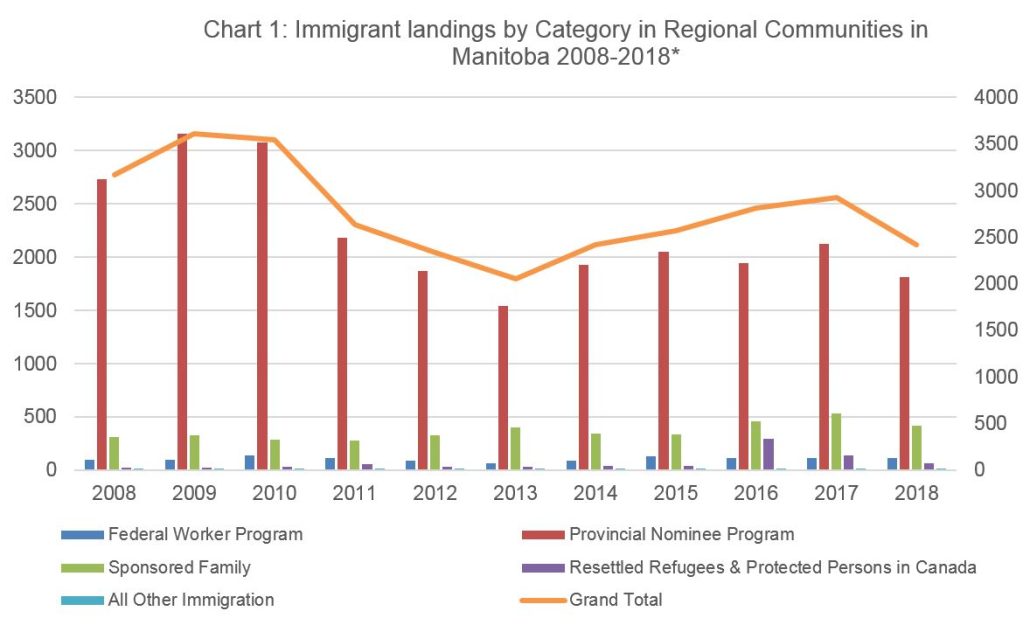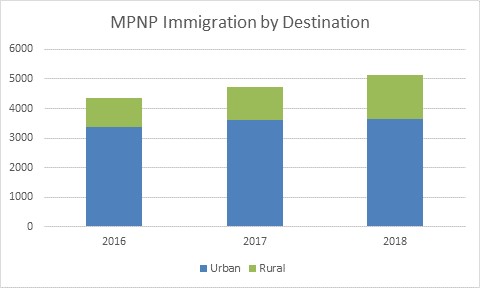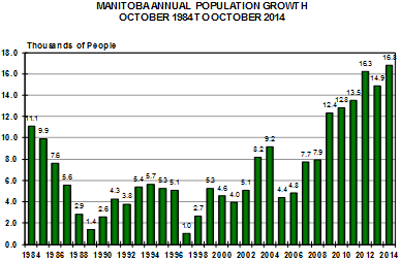This article originally appeared in the Spring 2019 issue of Municipal Leader - The Magazine of the Association of Manitoba Municipalities.
Honourable Kelvin Goertzen, MLA for Steinbach
Minister of Education and Training
Government House Leader
Over the last two decades, the MPNP brought in more than 130,000 economic immigrants to Manitoba of whom more than 20% established themselves in regional communities throughout the province.
In 2018 we celebrated the 20th anniversary of the Manitoba Provincial Nominee Program (MPNP) and the important contribution that immigration has made to the growth and vitality of our communities and our economy. Over the last two decades, the MPNP brought in more than 130,000 economic immigrants to Manitoba of whom more than 20% established themselves in regional communities throughout the province. For the sake of comparison, Manitoba received approximately 70,000 additional immigrants through federal programs during the same period of whom only 11% chose communities outside of Winnipeg (Chart 1).
Thus, the transformative impact of the MPNP is a story shared across many municipalities including my own community of Steinbach. In 1996, Steinbach had a population of 8,478 people which has now almost doubled, mostly due to the arrival of new immigrants. When I was growing up, I would have needed to get on a plane to travel the world. Today, my son only has to go to his local school to experience an incredible diversity of people and cultures. And the same story can be told for communities like Winkler and the RM of Stanley, long recognized as one of Canada's fastest growing municipalities. Winkler's population had doubled since 1996 and Morden has seen its population grow by welcoming, on average, 50 families a year from 2013 to 2018. Neepawa grew from 3,100 residents to over 4,300 in a three-year period, and now has over 4,600 residents.
These success stories have been built on strong partnerships between community and business leaders in local chambers of commerce and economic development offices, local employers, settlement agencies, our schools and colleges, and the MPNP. Companies like Maple Leaf and Hylife, as well as manufacturers and other businesses across Manitoba have participated in MPNP strategic recruitment initiatives to interview and hire immigrant skilled workers overseas and/or offer employment opportunities to the families and friends those workers encouraged to follow them to a new life in Canada.

*Data for 2018 includes those landed between January 1 and September 30, 2018.
Our success in attracting newcomers has been sustained by strong regional economies where unemployment rates have been as low as 3.1%, and immigration has in turn contributed to the labour force growth and business expansion of rural manufacturing and other industries. This success is also reflected in our ability to retain these newcomer families at a rate that has remained consistently between 87 and 90%. But these statistical facts are brought much closer to home for all of those communities that have been able to keep their schools open and in many cases even add additional schools and classrooms to keep up with their growing youth population.
Manitoba's rural immigration success story is also recognized across Canada and some communities have hosted delegations from other Provinces and Ottawa interested in learning why we have succeeded where others continue to struggle. The federal government recently announced a new ‘rural immigration pilot' which essentially builds on Manitoba's best practices – partnerships with local business and economic development leaders, strong settlement planning and targeted recruitment to fit local needs – with the objective of replicating our success in northern Ontario and other jurisdictions.
In Manitoba, we are certainly not taking our immigration success story for granted. That is why one of our government's earliest public commitments in 2016 was to strengthen and renew the MPNP by eliminating the application backlog and improving the labour market outcomes of our nominees. In 2017, we successfully eliminated a backlog of close to 4000 applications, many with processing times of more than two years, to a new standard where every complete MPNP application is processed in less than six months. In 2018, we issued 5119 skilled worker nominations, the highest number in MPNP history. In addition, more than 78.6% of these nominees were already connected to a Manitoba employer – again, the highest number ever. Finally, 28.8% of our nominations were for 93 different communities outside of Winnipeg.

MPNP: The Next 20 Years
We want to work with our rural partners to continue building on our immigration success story. To make this possible, here are some things that we are doing to continue strengthening the MPNP as well as some suggestions about how more Manitoba communities can take advantage of these improvements.
MPNP rural immigration toolkit
In the weeks ahead, the MPNP will be rolling out a new rural immigration toolkit on the program website to help communities who are newer to the immigration process benefit from the proven best practices of their fellow municipalities who have already experienced the benefits of workforce and population growth. This toolkit will help communities to engage key business stakeholders and local leaders to begin planning to welcome newcomers and optimize their potential to contribute to local employment and business investment. It will also support community planners to develop recruitment strategies that leverage the MPNP and other immigration pathways to achieve local economic development objectives.
Improving rural employer engagement
We are expanding options and opportunities for employers interested in hiring potential nominees and recent newcomers by:
- Building innovative partnerships with industry, sector councils and Chambers of Commerce to strengthen access to ‘real-time Labour Market Information', employer input to applicant selection and employer hiring from applicant pools.
- Increasing employer direct recruitment of permanent workers through more responsive and flexible access to Labour Market Impact Assessment-exempt work permits under the Provincial Nominee Program.
- Expanding options for employers for overseas and local recruitment through international recruitment initiatives, recruitment of workers on exploratory visits, and more streamlined processes for recruiting higher skilled, higher wage workers.
Attracting rural business investment
We have recently introduced a new MPNP business stream by replacing the previous deposit-based model with a new process through which business applicants are encouraged to establish and actively manage a qualifying business earlier while on a temporary work permit. We are encouraging new applicants to consider investing in rural businesses through a lower total investment requirement of $150,000 and higher points for rural business plans. In addition, we are currently negotiating with the Government of Canada, a new rural investment pathway that will also support rural succession planning.
Investing MPNP revenues in improving immigrant outcomes
In 2019, we will be implementing a public commitment to invest the revenues from MPNP application fees in program and service improvements that will support better economic outcomes for all newcomers, including those establishing in rural communities. We will work collaboratively with all levels of government to ensure that smaller centres are able to support newcomer families at all points along their pathway to permanent residence and citizenship.
Renew the Canada Manitoba Immigration Agreement (CMIA)
Manitoba's immigration success story is built on a strong partnership with Immigration, Refugees and Citizenship Canada. However, the bilateral agreement that supports that partnership and the MPNP has not been renewed since 2003. In renewing our MPNP agreement we have communicated two clear priorities:
- Improve MPNP responsiveness to rural economic development: economic development priorities vary according to the specific requirements of different regional communities and economies. The challenge with the ‘one-size fits all' approach imposed by federal minimum criteria (e.g. language etc.) is that it reduces the flexibility of the MPNP to respond to the unique local needs of specific industries and communities. If communities can demonstrate the ability to support the success of newcomers, not all of whom may meet minimum requirements, the MPNP needs to have the flexibility to respond.
- Reduce federal permanent visa processing times for nominees: we need to address the inherent unfairness that applicants to federal programs (mostly going to larger cities and provinces) are processed within six months for a permanent visa while most Provincial Nominees have to wait for as long 18 months for the same visa. This delays the arrival of newcomers to our rural communities and employers, and unnecessarily and unfairly delays these families from contributing their skills and investments to our economy.
Compensating Manitoba for our asylum-seeker response
Finally, I would like to thank our rural municipalities for their role in supporting a humane and well-managed response to the unexpected arrival of record numbers of asylum-seekers in Manitoba. We continue to ask the Government of Canada to compensate Manitoba and Manitoba communities for their efforts in the same way that has been done for other jurisdictions.
Let me conclude by emphasizing once again, the importance of growing our regional communities and strengthening our rural economies. The MPNP is certainly not the only tool we have to accomplish these priorities, but as so many of your municipalities have shown, it is a proven and highly effective program to consider in your economic development planning.
If your community is interested in learning more, I encourage you to contact the MPNP by sending an e-mail to immigratemanitoba@gov.mb.ca with the subject line "Rural Immigration." Working together, we can continue to build on Manitoba's rural immigration success story.

